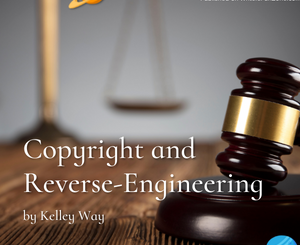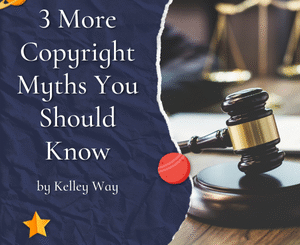Using Real People in Stories: Part 3 of 3, By A Copyright Law Attorney

Welcome to our regular column on literary law. Today we focus on the thorny issue of using real people in our stories, part 3 of 3 — from our monthly guest columnist, Kelley Way, a lawyer specializing in literary law. If you have general questions for Kelley on contracts or other aspects of literary law, be sure to comment below. Thanks!
PS. A list of books on literary law can be found here.
PPS. For more on copyright, visit the U.S. Copyright Office.
And now for a bit of necessary legalese: Please note that this article does not constitute legal advice, and that an attorney-client relationship is not formed by reading the article or by commenting thereon.
***
In Parts 1 and 2, we covered defamation and privacy rights, and how they applied to literary law. Today we turn to the right of publicity, which is a favorite among celebrities.
The right of publicity is actually an offshoot of the right of appropriation, which we covered in Part 2.
It even has the same definition: the use of a person’s name, image, or other identifying characteristic for a commercial purpose.
Don’t worry if you’re confused; some courts still haven’t figured out the difference, and mix up the names for them, creating some murky case law. The key difference is this: appropriation is about protecting your privacy, while the right of publicity is about protecting the commercial value of your identity.
Let’s go back to some examples. In Part 2, John was suing you for appropriation after you used pictures of him for the cover of your novel. The idea there was that you invaded his privacy, causing him embarrassment and distress. Now let’s say that John is a studly movie actor, and you used a picture you cut out of a magazine instead of camera-stalking him. He’s in the public eye, so he can’t say his privacy was invaded, and he’s hardly going to be embarrassed to have his picture all over the place, even if it is on the cover of a romance novel. No, he’s upset because first, someone’s making money off his face and it’s not him; and second, now everyone will think he endorses romance novels, or at least can be paid to model for them, which could quite possibly damage his reputation and/or affect current and future contracts. These are grounds for a right of publicity lawsuit, rather than right of appropriation.
Unlike the right of appropriation, the right of publicity can be passed on after one’s death, at least in California. States vary on whether and how long this right lasts after death, so this would be important to look into if you want to use a deceased celebrity in your novel.
The key to right of publicity suits is whether the celebrity’s name or image is being used to sell a product. The more it seems the defendant is trying to capitalize on the plaintiff’s fame, the more likely the defendant is to lose. Merely mentioning a celebrity is not going to get you in hot water: the person is famous, so it’s expected that people will talk about them, in real life and in books. It’s only when you’re trying to use the celebrity to sell the book that you get into trouble.
There are exceptions, however. A person can’t use the right of publicity to suppress free speech, so reporting news or publishing a true story is fine. Even a biography is perfectly acceptable (though I’d tread carefully there; it’s always best to get permission before writing someone’s life story.)
The courts have also found nothing wrong with writing fiction about a celebrity, as long as the author makes it clear that it is actually fiction. Again, I would use caution in doing this, since angry celebrities are pretty good about finding some grounds to sue you on. In short, writers have more slack than others using the celebrity’s name, but that’s not a free pass, so proceed with caution.
And that is right of publicity in a nutshell. As always, comments, questions, criticisms, and angry tirades can be directed to the comment section below.
I’m also interested to hear your thoughts on literary law.
Are these articles giving you a good grasp of the subject? Is there a topic you’re interested in reading about? Let me know!
***
ABOUT THE AUTHOR
 Kelley Way was born and raised in Walnut Creek, California. She graduated from UC Davis with a B.A. in English, followed by a Juris Doctorate. Kelley is a member of the California Bar, and an aspiring writer of young adult fantasy novels. She can be contacted at KelleyAWay@gmail.com. You can contact via your comments below or email her directly to set up a consultation.
Kelley Way was born and raised in Walnut Creek, California. She graduated from UC Davis with a B.A. in English, followed by a Juris Doctorate. Kelley is a member of the California Bar, and an aspiring writer of young adult fantasy novels. She can be contacted at KelleyAWay@gmail.com. You can contact via your comments below or email her directly to set up a consultation.






